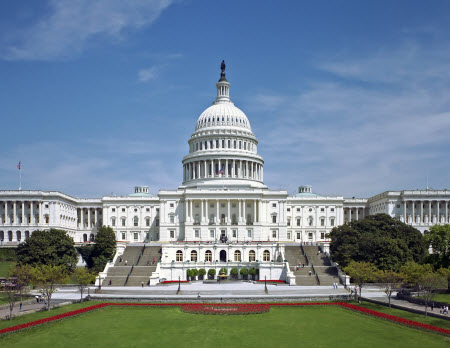Hill Ponders Taking Tougher Antitrust Stance on Tech
House Antitrust Committee is wrapping up Big Tech investigation

The smarter way to stay on top of the multichannel video marketplace. Sign up below.
You are now subscribed
Your newsletter sign-up was successful
The House Antitrust Subcommittee took on Big Tech Thursday (Oct. 1) in a hearing on potentially toughening antitrust laws to make sure they protect online competition. The subcommittee has been investigating the state of competition in digital markets since June 2019.
Thursday's was the seventh and final hearing as they wrap up their investigation.
And while there were differences over how it should be done--break up or not, for example--there was agreement that something had to be done about Big Tech and the antitrust laws, some arguing that what was needed was better enforcement rather than government "intrusion"--primarily Republicans--others that the antitrust laws needed to be revised or potential new regs implemented--primarily Democrats.
Antitrust chairman David Cicciline (D-R.I.) said that the subcommittee has conducted a top-to-bottom review of Amazon, Apple, Google and Facebook, including collecting almost 1.3 million internal documents and communications. The hearing record totals over 1,800 pages.
The sixth hearing, held in July, featured testimony from the Tim Cook of Apple, Jeff Bezos of Amazon, Jeff Zuckerberg of Facebook and Sundar Pichai of Alphabet (Google). Cicciline said their answers had been "evasive and nonresponsive."
He also said the investigation had found three main problems common to all of those Big Four companies:
1. Each platform is a gatekeeper over a key channel of distribution, which means they are able to pick winners and losers. He said they abuse that power by charging exorbitant fees, imposing oppressive contracts and extracting valuable personal data.
2. Each platform uses its gatekeeper status to protect their own power by controlling infrastructure and identifying potential rivals and ultimately "bought out, copied, or cut off their competition."
3. The platforms abuse, and continue to abuse, their platforms to expand their marketplace power through destructive means such as self-referencing and predatory pricing.
He conceded that each had achieved technological breakthroughs that added immense value to the country and were a testament to core values of the country. But he said the the committee had followed the evidence and the facts, and it led them to a conclusion that Big Tech firms have been allowed to regulate themselves and that the once scrappy underdog startups have grown into the digital era's oil barons and railroad tycoons.
He said the country stood at a crossroads, and needed to determine the best path forward for addressing those competition issues.
Ranking member Jim Sensenbrenner (R-Wisc.), the former chairman who is retiring after 42 years in Congress, said Congress clearly needed to get a grasp on the size of these companies and how they use that power, but that he was not convinced the antitrust laws needed to be changed. He said Congress was ill-suited at micromanaging the economy.
He said he was skeptical of calls to break up the companies, or create a "one-size-fits-all data standard. He thought the antitrust framework still served the American people and that having the government insert itself in their operations was the right course of action. He said enforcement of existing laws needed to be bolstered, which he said was already happening. He cited ongoing investigations by the Justice Department and the Federal Trade Commission and reports DOJ is readying a case against Google.
Judiciary Committee chairman Jerrold Nadler (D-N.Y.) said the investigation bore out his concerns about the harmful effects of consolidation. "Each of the major companies that were part of this investigation, in its own way, exerts dominant control in the digital marketplace that is cause for great concern."
He said his belief that the antitrust laws have to be modernized and strengthened "is greater than ever." He also said enforcement agencies, like the FTC, have the "tools, resources and the will" to vigorously enforce the law."
He said antitrust enforcers "must not pull punches."
As with any Big Tech hearing these days, the issue of censoring the right made an early appearance. In his opening statement, full committee ranking member Jim Jordan (R-Ohio), said to lead off: "Big Tech is out to get conservatives. That is not a suspicion. That's not a hunch. It's a fact."
Jordan was echoing the point he made at the July hearing with the four Big Tech execs.
He complained that Democrats would not make a part of the investigation of the companies "an evaluation of how platforms are censoring speech." He said maybe that was because liberal speech was not being censored. As an example he cited Twitter censoring Sen. Marsha Blackburn (R-Tenn.) a point Blackburn had made earlier in the day on the other side of the Capitol, where the Senate Commerce Committee voted to subpoena the CEO's of Google, Facebook and Twitter after they declined an invitation to testify.
Jordan said Big Tech has gotten away with censoring conservatives thanks to the protection of Sec. 230 immunity from civil liability over moderation of third-party content.
Jordan and other Antitrust Subcommittee Republicans have introduced a bill that would reform the section to narrow that immunity to specific instances rather than the "otherwise objectionable" category he said has been used to censor political speech.
The smarter way to stay on top of the multichannel video marketplace. Sign up below.
Contributing editor John Eggerton has been an editor and/or writer on media regulation, legislation and policy for over four decades, including covering the FCC, FTC, Congress, the major media trade associations, and the federal courts. In addition to Multichannel News and Broadcasting + Cable, his work has appeared in Radio World, TV Technology, TV Fax, This Week in Consumer Electronics, Variety and the Encyclopedia Britannica.

